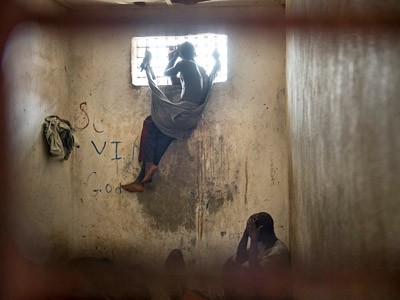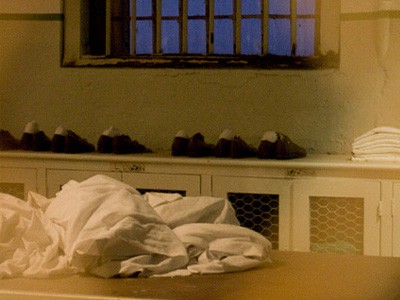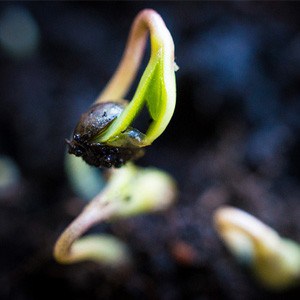Seeking liberation while in prison
An interview with Lama Zopa Rinpoche

Venerable Thubten Chodron (VTC): Some of the incarcerated people I write to and visit participated in the Vajrasattva retreat while it was going on at Sravasti Abbey.
Lama Zopa Rinpoche (LZR): There was one person I wrote a long letter to. He was in line to be executed, but I heard it was postponed for a year.
VTC: I sent the letter you dictated to him to the incarcerated people I write to.
LZR: It’s wonderful that many of them do prostrations and a lot of practice. They have a great opportunity. It’s like doing retreat, strict retreat where you don’t see people.
VTC: Except they do hear people. It’s very noisy in prison. One man who wrote us said he meditates on the top bunk and the light bulb is about two feet from his head. There are 300 other men in this dorm room and some of them are talking and shouting while he is trying to do his meditation. But they are very determined in their practice despite these conditions.
LZR: They are so lucky. Those who are practicing, who are able to accept the Dharma with open mind and practice it, are so fortunate. Once they open their minds to Buddhism and engage in practice, they’re liberating themselves from the prison of samsara. Even they are physically in prison, in reality they are going out of prison.
VTC: This weekend I’m going to Cleveland. I’ll teach at a Dharma center and will also visit two prisons. At one of the prisons, there is a man who is in for murder, and he wants to take refuge and the five lay precepts, so we’re going to do the ceremony in the prison. Isn’t that incredible?
LZR: That’s great. He’s now reading Dharma books? (TC nods.) You corresponded with him before? (TC nods.) How did you first start writing to prisoners? They’re in prison already and haven’t met Dharma before, so how did it happen that they met you and the Dharma?
VTC: Sometimes I don’t know. Once I asked the very first man I corresponded with, “How did you get my address?” He said he wrote a letter to about 25 Dharma centers asking for books and help with his questions, and I was the only one who responded. He had kept a list of all the centers he wrote to, but when he looked at it later, the center that I was at wasn’t on the list! So we don’t know how I got his letter.
VTC: Another man said that his cellie left a book behind when he moved, and a few years later he picked it up. He didn’t know anything about Buddhism, and it was a Dharma book and inside was my address. So he wrote to me. I don’t know how other people get my address, Rinpoche. I never went looking for them, but they come to me.
LZR: Good karma. Karmic connection. That shows you have a karmic connection from the past. Somehow, in the time they need help, they have the karmic connection to Buddhism from the past. Since the karmic imprint is there, this is possible. It happens because they have the karmic connection to Buddhism in the past, and also they have karma with you and you have karma with them. Because there is a karmic connection between you and those people, there’s also the possibility that Buddhas and bodhisattvas use you—through you they help them. So this is possibly how they get engaged and practice Dharma. That imprint from the past connected to Buddhism so that karma ripens in that situation. They have karma with Buddhism and with you, so this how it works, how it happens.
VTC: If I can be of benefit to others, then I am very happy.
LZR: That’s how they get help and you inspire them to practice. That is great. Even they don’t come out of prison this life, their lives are meaningful. If they got out of prison, they’d see that life outside is full of defilements. People are so engaged in distractions— boyfriends, girlfriends, and many other distractions. Life outside is full of activities; you’re in the middle of all the distractions so it’s difficult to continue to practice Dharma. That’s why people go to hermitages or caves to discipline their minds—those environments help them to subdue their minds and thus they’re able to actualize the path. That’s the purpose of a hermitage, monastery, or cave. Here the difference is they’re in one big building and there’s a lot of noise, but otherwise it’s like a retreat setting in the sense that they don’t have all the distractions that take people on the outside away from their Dharma studies practice. Are incarcerated people usually with just a few people?
VTC: It depends. Each situation is different. Some are in an enormous room with 300 other men, sleeping in bunk beds. When the officials want to punish someone, they keep him in a cell by himself and he can leave it a few times a week to get exercise for an hour. Some of those situations are quite difficult. One man has only a small window in his room, and it’s frosted, not clear, so he can’t see outdoors at all. In other situations, they may be in a cell with one other person.
LZR: Are there some men with emotional difficulties who fight? Do they sometimes kill each other?
VTC: Yes, prison can be a very violent and dangerous place. Two weeks ago I visited an man in Illinois. He told me that one day he was out on the yard. He was standing and talking with a man he didn’t know very well. They were almost ready to go back in the building and a group formed around them. Then, all of a sudden, one man came out of the group and stabbed the man that he was talking to. (Rinpoche gasps and closes his eyes in horror.) My friend told me that there was nothing he could do. It was a gang-related murder. When the crowd dispersed, my friend was scared because he has seen the killing and knew who did it. So his life was in danger. But fortunately, they didn’t attack him afterwards.
LZR: Did the man die?
VTC: Yes, right there. Some of the other men I write to have seen similar things and tell me how dangerous being in prison is. There are many people there who are mentally unbalanced and who are not receiving proper medical treatment.
LZR: What else?
VTC: I put some of the writings by incarcerated people on the website. They write about the Dharma and how they practice. Since what they say is very good and others can learn from it, I put it on the website. One day I got an email from someone who wrote regarding one of the incarcerated people whose writings are on the website, “Is this the same man who just took a guard hostage? Why do you have such a person’s writing on your website?” He was very angry. I went to the news and saw that, yes, the man I’d been writing to for some years had just taken a female prison guard for about four hours. He wrote and told me about it afterwards. At one point, she said, “I have a family and don’t want to die.” He said, “Don’t worry, I won’t hurt you.” He told me that once he gave her his word that she wouldn’t be harmed, he knew he had to resolve the situation peacefully. Eventually more guards came in, wearing armor and carrying weapons, and he lay down and let them take him away. He didn’t hurt her. This man has a lot of mental suffering, but when he’s clear, he writes wonderful Dharma articles. So I wrote back to the person who sent me the email and said, “Everyone has Buddha nature—the potential to become a fully enlightened Buddha. This man is not his actions, and I’m not going to abandon him just because he made a mistake.”
LZR: Did that person write back?
VTC: No. Some of the stories by incarcerated people—what happens in samsara—are incredible. Sometimes they tell me about their lives when they were children. It’s very sad because most of them came from homes where the parents fought a lot or were separated. Sometimes their parents were alcoholics. Very often they were beaten or badly abused as children. I think of the men I know in prison and then think of children who are being abused now, who will grow up, act out, and land in prison. I feel very sad about this and wish something could be done to protect these children. Some of the incarcerated people really turn their lives around. Rinpoche, what speaks loudest to them is bodhicitta. That is what they love the most. The men who are ready to practice the Dharma—and that certainly isn’t everyone in prison—say, “I’ve done many harmful things in my life and now I want to do something that benefits others.” That they can be of benefit to others is what is so meaningful to them.
LZR: That is wonderful. After what they did on negative side, now they have similar potential to do the opposite—to act positively, to bring happiness to others, to relieve others’ suffering. They have the same potential but now they’re using it in a different way, bringing happiness to themselves and others. They see that they can do something else, and this is a wonderful source of inspiration.
VTC: Otherwise, if they only think of the negative actions, people feel depressed. But now they see that their lives are more than those actions they did in the past. Now they think, “I can do something good, something that benefits others, and that makes my life meaningful.”
LZR: If someone thinks only about their harmful actions, they may feel there’s no hope, that there’s nothing they can do. I’m sure they don’t allow incarcerated people to have weapons, but if they did, some of them, if they don’t know the Dharma, may commit suicide because they have aversion to prison.
VTC: Some guys do succeed in getting weapons. You can get weapons in prison and drugs in prison.
LZR: Really?
VTC: Yes.
LZR: You mean in prison there is still the karma to get drugs?
VTC: Those who get off drugs and alcohol in prison really want to stop, because they could still get them there if they wanted. But they decide, “No, I’m finished with drugs and alcohol.”
LZR: Really?
VTC: Yes, some of them do that. It’s wonderful.
LZR: Amazing. It’s a great thing.
Venerable Thubten Chodron
Venerable Chodron emphasizes the practical application of Buddha’s teachings in our daily lives and is especially skilled at explaining them in ways easily understood and practiced by Westerners. She is well known for her warm, humorous, and lucid teachings. She was ordained as a Buddhist nun in 1977 by Kyabje Ling Rinpoche in Dharamsala, India, and in 1986 she received bhikshuni (full) ordination in Taiwan. Read her full bio.


